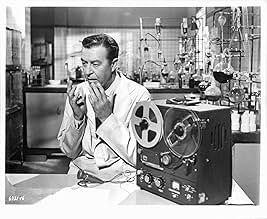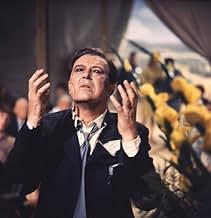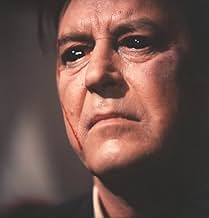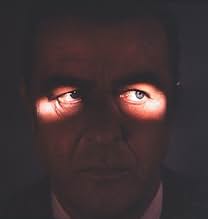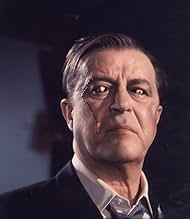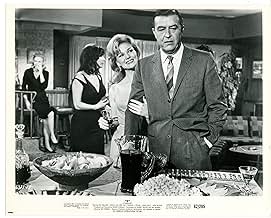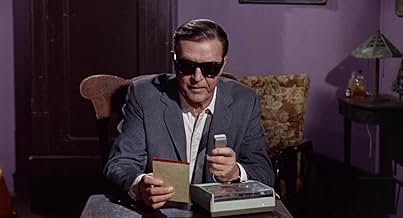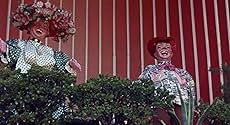PUNTUACIÓN EN IMDb
6,6/10
8,8 mil
TU PUNTUACIÓN
Un médico usa gotas especiales para los ojos para obtener visión de rayos X, pero el nuevo poder tiene consecuencias desastrosas.Un médico usa gotas especiales para los ojos para obtener visión de rayos X, pero el nuevo poder tiene consecuencias desastrosas.Un médico usa gotas especiales para los ojos para obtener visión de rayos X, pero el nuevo poder tiene consecuencias desastrosas.
- Dirección
- Guión
- Reparto principal
- Premios
- 2 nominaciones en total
Diana Van der Vlis
- Dr. Diane Fairfax
- (as Diana van der Vlis)
Budd Albright
- Dance sequence
- (sin acreditar)
Leon Alton
- Casino Patron
- (sin acreditar)
Morris Ankrum
- Mr. Bowhead
- (sin acreditar)
Benjie Bancroft
- Dealer
- (sin acreditar)
George DeNormand
- Medical Board Member
- (sin acreditar)
John Dierkes
- Preacher
- (sin acreditar)
Bobby Gilbert
- Man Outside Office
- (sin acreditar)
Stuart Hall
- Casino Patron
- (sin acreditar)
Kathryn Hart
- Mrs. Mart
- (sin acreditar)
Ed Haskett
- Casino Patron
- (sin acreditar)
Jonathan Haze
- Heckler
- (sin acreditar)
Harvey Jacobson
- Casino Boss
- (sin acreditar)
Vicki Lee
- Young Girl Patient
- (sin acreditar)
Reseñas destacadas
... in that a doctor makes a great discovery -in this case a formula that allows people to "see through" objects, starts out trying to do good, becomes his own guinea pig, becomes obsessed, becomes bitter because others do not see the importance of his discovery, and in the end just makes a bunch of stupid decisions. Oh, and the formula is cumulative and yet the doctor keeps taking it!
This film would be completely unmemorable without Ray Milland as the title character - Dr. Xavier. Like with his other horror films, independent producer/director Roger Corman smartly uses a lead from the golden age of Hollywood - in this case Milland - and builds a simple story that still strikes at the essence of fear in human beings.
There are a quite a few goofy and outright dumb things going on.When Xavier goes on the run because of a tragic accident, he ... decides to work as a "seer" in a carnival?? Isn't that one of the first places the police might come looking for him? In his quest for money to look for a "cure" for his situation, he decides to go to Vegas. And win a bunch of money in just one casino. And get a loud and obnoxious attitude about it. Maybe the most tragic thing about Xavier's situation is that he is inflicted with the company of Don Rickles during the mid part of the film.
The one fun and light hearted moment of the film is when Xavier is invited to a swinging 60s party and because of his unique condition sees naked people everywhere. Roger Corman will need to wait a few more years into the 60s before he can feature actual naked people. But I digress.
The special effects are laughable in the 21st century, but Milland's distinguished and empathetic presence makes this work. And it goes after the question - If you can see through EVERYTHING, what exactly DO you see?
This film would be completely unmemorable without Ray Milland as the title character - Dr. Xavier. Like with his other horror films, independent producer/director Roger Corman smartly uses a lead from the golden age of Hollywood - in this case Milland - and builds a simple story that still strikes at the essence of fear in human beings.
There are a quite a few goofy and outright dumb things going on.When Xavier goes on the run because of a tragic accident, he ... decides to work as a "seer" in a carnival?? Isn't that one of the first places the police might come looking for him? In his quest for money to look for a "cure" for his situation, he decides to go to Vegas. And win a bunch of money in just one casino. And get a loud and obnoxious attitude about it. Maybe the most tragic thing about Xavier's situation is that he is inflicted with the company of Don Rickles during the mid part of the film.
The one fun and light hearted moment of the film is when Xavier is invited to a swinging 60s party and because of his unique condition sees naked people everywhere. Roger Corman will need to wait a few more years into the 60s before he can feature actual naked people. But I digress.
The special effects are laughable in the 21st century, but Milland's distinguished and empathetic presence makes this work. And it goes after the question - If you can see through EVERYTHING, what exactly DO you see?
I just (finally) saw this film a few days ago, after years of hearing about it. The screening was the final show of a three-day SF/horror film festival. After three days of films, most people were feeling a bit loopy and ready for some light entertainment. As X opened, quite a few members of the audience started treating it as an episode of Mystery Science Theater 3000, shouting out their own (generally lame) joke comments in response to the film. I was annoyed, because I'd been looking forward to this film all weekend (although, in their defense, certain lines have become unintentionally loaded in the comparatively sexually liberated 21st century).
What I found fascinating was that, by 15 minutes into the movie, all the commentary stopped. Once the film moved beyond the talky opening scenes and stilted dialog, once the story really got going, everyone was drawn into it. They actually paid attention to the movie instead of each other.
As SF cinema goes, this is definitely one of the more entertaining, thoughtful, and intelligent examples (and intelligent SF film is a dying genre). This one goes well beyond the standard mad scientist formula.
What I found fascinating was that, by 15 minutes into the movie, all the commentary stopped. Once the film moved beyond the talky opening scenes and stilted dialog, once the story really got going, everyone was drawn into it. They actually paid attention to the movie instead of each other.
As SF cinema goes, this is definitely one of the more entertaining, thoughtful, and intelligent examples (and intelligent SF film is a dying genre). This one goes well beyond the standard mad scientist formula.
This is one of my favorite Roger Corman flicks. Brisk pace and many surprises. Don Rickles as a ruthless carny exploiteer is one of them. Milland wears more and more ridiculous sunglasses as the movie progresses.
Seriously, this is one of Don Rickles' best performances -- it shows that he could have gone in a totally different direction than he followed for most of his career (as an "insult comedian") if he had wanted to. I imagine that his appearance in the film had something to do with his contract with AIP, but I still think it's a bit of VERY inspired casting (regardless of the financial reasons that may have been behind it).
Milland is also excellent in the type of role that suits him to a T... he gets to be kind of a Dr. Frankenstein here, convinced he's doing good for humanity but making himself into a monster in the process.
A memorable story with a meaning.
Seriously, this is one of Don Rickles' best performances -- it shows that he could have gone in a totally different direction than he followed for most of his career (as an "insult comedian") if he had wanted to. I imagine that his appearance in the film had something to do with his contract with AIP, but I still think it's a bit of VERY inspired casting (regardless of the financial reasons that may have been behind it).
Milland is also excellent in the type of role that suits him to a T... he gets to be kind of a Dr. Frankenstein here, convinced he's doing good for humanity but making himself into a monster in the process.
A memorable story with a meaning.
To this writer, the film is Roger Corman's best entry into sci-fi. Many of his 50s efforts hold a certain campy charm, with their low-budget effects - and this film is similar in that regard. It does not dwell on the effects, in fact some of them are rather poor. What it does have in its favor is a tight screenplay that gets into the story quickly, as will the viewer - and it's engrossing enough and the characters interesting enough that one stays involved through the episodic story.
What it has most in its favor is an excellent performance from Ray Milland, then in his last days being top-billed, and he milks it for all that it's worth. In some scenes Corman goes for a direct close-up and Milland's facial reactions indicate that he took the the role in a small-budget/tight schedule film with all the enthusiasm that he did in one of his roles for Alfred Hitchcock ("Dial M For Murder") or Fritz Lang ("Ministry of Fear"). Smooth, refined, but a man of immediate action if necessary, Milland's Dr. Xavier is not your usual mad scientist. As with Claude Rains in "The Invisible Man" or Al Hedison in "The Fly" he's the scientist who made the mistake of being his own subject.
Occasionally Corman goes for the cheap gag (the party sequence, where Xavier examines the guests sans attire - but inoffensive in a typical 60s approach), but the carnival scenes and the basement healer scenes show a maturity to Corman's direction, and these scenes are greatly helped by the performance of Don Rickles. He's as sleazy as one can get and admits that if he had the power, he would use it to see "all the undressed women my poor eyes can stand" and you believe it. A scene where Milland confronts other carnival workers who are speculating on his "power" shows the doctor to be both introspective and world weary at the same time. At this point even he does not know what to do with his ability, but Rickles' suggestion of setting up a site to "heal" others leads to the film's most revealing and almost poetic sequence. Xavier's original intention was to help the ill, but his implication in an accidental murder led him to seek refuge in the carnival Richard Kimble-style.
Diana Van Der Vlis does well with her underwritten role in which at one point she's rather quickly dropped, and then resurfaces rather conveniently later in the story - to no great effect. This was only her second feature film, though she had done a number of TV guest shots. Although half Milland's age, she seems more mature than her 28 years and they make a believable pair. A bonus is the appearance of a number of veterans in brief roles - John Hoyt, Harold J. Stone, John Dierkes and Morris Ankrum, as well as Corman stalwart Dick Miller. Miller shares his scenes with Jonathan Haze, whom it appears was getting the cheapest rate Corman could pay as he has no lines at all. He was rather bitter about this as he revealed in an interview years later.
Floyd Crosby's cinematography belies the small budget - only $300,000 and a shooting schedule of about three weeks. According to Corman they did rehearse a bit more than usual - and in the finished product it shows. He claims he even went as high as four takes, which may not exactly put him in William Wyler or Stanley Kubrick territory, but it's a far cry from what he'd do in the 50s. Les Baxter contributes what may be my favorite of his scores, fully complimentary to the action on screen without overwhelming it.
There's a bit of controversy over the ending - some attribute an extra line of dialog that never appeared in any print that I've seen, but it is still one of the most surprising endings of any sci-fi film since "The Incredible Shrinking Man." That it won the top prize at the Trieste Science Fiction Film Festival would be enough for one to be curious enough to see it even this many years later - that it has held up so well over 40 years points to that award's validity.
What it has most in its favor is an excellent performance from Ray Milland, then in his last days being top-billed, and he milks it for all that it's worth. In some scenes Corman goes for a direct close-up and Milland's facial reactions indicate that he took the the role in a small-budget/tight schedule film with all the enthusiasm that he did in one of his roles for Alfred Hitchcock ("Dial M For Murder") or Fritz Lang ("Ministry of Fear"). Smooth, refined, but a man of immediate action if necessary, Milland's Dr. Xavier is not your usual mad scientist. As with Claude Rains in "The Invisible Man" or Al Hedison in "The Fly" he's the scientist who made the mistake of being his own subject.
Occasionally Corman goes for the cheap gag (the party sequence, where Xavier examines the guests sans attire - but inoffensive in a typical 60s approach), but the carnival scenes and the basement healer scenes show a maturity to Corman's direction, and these scenes are greatly helped by the performance of Don Rickles. He's as sleazy as one can get and admits that if he had the power, he would use it to see "all the undressed women my poor eyes can stand" and you believe it. A scene where Milland confronts other carnival workers who are speculating on his "power" shows the doctor to be both introspective and world weary at the same time. At this point even he does not know what to do with his ability, but Rickles' suggestion of setting up a site to "heal" others leads to the film's most revealing and almost poetic sequence. Xavier's original intention was to help the ill, but his implication in an accidental murder led him to seek refuge in the carnival Richard Kimble-style.
Diana Van Der Vlis does well with her underwritten role in which at one point she's rather quickly dropped, and then resurfaces rather conveniently later in the story - to no great effect. This was only her second feature film, though she had done a number of TV guest shots. Although half Milland's age, she seems more mature than her 28 years and they make a believable pair. A bonus is the appearance of a number of veterans in brief roles - John Hoyt, Harold J. Stone, John Dierkes and Morris Ankrum, as well as Corman stalwart Dick Miller. Miller shares his scenes with Jonathan Haze, whom it appears was getting the cheapest rate Corman could pay as he has no lines at all. He was rather bitter about this as he revealed in an interview years later.
Floyd Crosby's cinematography belies the small budget - only $300,000 and a shooting schedule of about three weeks. According to Corman they did rehearse a bit more than usual - and in the finished product it shows. He claims he even went as high as four takes, which may not exactly put him in William Wyler or Stanley Kubrick territory, but it's a far cry from what he'd do in the 50s. Les Baxter contributes what may be my favorite of his scores, fully complimentary to the action on screen without overwhelming it.
There's a bit of controversy over the ending - some attribute an extra line of dialog that never appeared in any print that I've seen, but it is still one of the most surprising endings of any sci-fi film since "The Incredible Shrinking Man." That it won the top prize at the Trieste Science Fiction Film Festival would be enough for one to be curious enough to see it even this many years later - that it has held up so well over 40 years points to that award's validity.
This was the typically-hokey-but fun Roger Corman film but one that keeps your interest most the way and at least stars a famous classic-era actor: Ray Milland. One actually wonders what an actor of Milland's status would doing in a B Grade B-type sci-fi movie like this. For someone who had admired Milland's work for many years, it just seems odd for me to see him in a small-budget film. Maybe things got tough for him near the end of his career and he would take most any role. I don't know, and I'm not judging.....just curious why he took this role. I do know having him in the movie elevates it and the dialog isn't as cheesy as one would expect in a 1950-ish sci-fi horror story made in the '60s.
Comedian Don Rickles playing a greedy criminal guy was another odd cast selection, but, he, too, was fun to watch.
Corman was smart to keep this at a respectable 79 minutes. Had it gone on longer, it would have started to drag. It would be interesting to see this film done with today's special-effects.
Comedian Don Rickles playing a greedy criminal guy was another odd cast selection, but, he, too, was fun to watch.
Corman was smart to keep this at a respectable 79 minutes. Had it gone on longer, it would have started to drag. It would be interesting to see this film done with today's special-effects.
¿Sabías que...?
- CuriosidadesTo create the effect of being able to see through a building, the director filmed the building while it was under construction.
- PifiasThe first X-ray that Dr. Xavier quizzes Dr. Fairfax with is a normal chest X-ray. There is no bullet on that film. Bullets show up very well on X-rays.
- Citas
Dr. Diane Fairfax: What do you see?
Dr. James Xavier: The city... as if it were unborn. Rising into the sky with fingers of metal, limbs without flesh, girders without stone. Signs hanging without support. Wires dipping and swaying without poles. A city unborn. Flesh dissolved in an acid of light. A city of the dead.
- Versiones alternativasThrough an apparent lab error, some of the 16mm U.S. television syndication prints had the ending credits in Spanish.
- ConexionesEdited into Gli ultimi giorni dell'umanità (2022)
Selecciones populares
Inicia sesión para calificar y añadir a tu lista para recibir recomendaciones personalizadas
- How long is X: The Man with the X-Ray Eyes?Con tecnología de Alexa
Detalles
Taquilla
- Presupuesto
- 250.000 US$ (estimación)
- Duración1 hora 19 minutos
- Mezcla de sonido
- Relación de aspecto
- 1.85 : 1
Contribuir a esta página
Sugerir un cambio o añadir el contenido que falta


